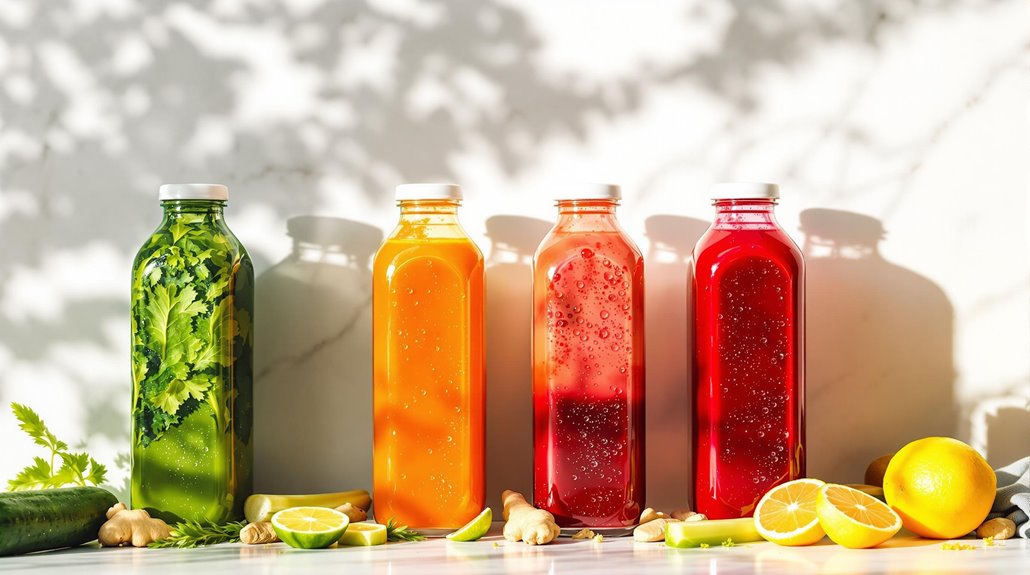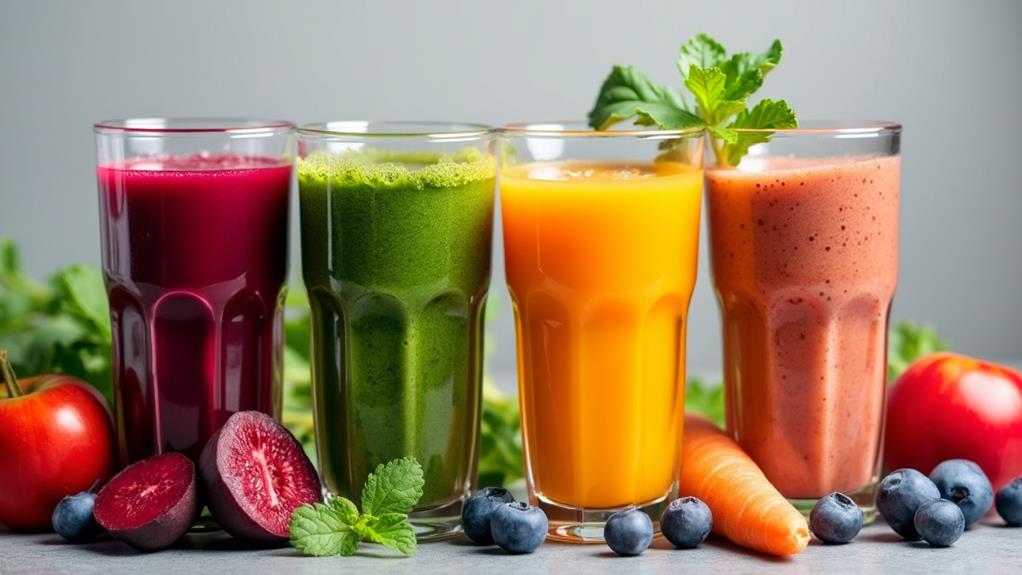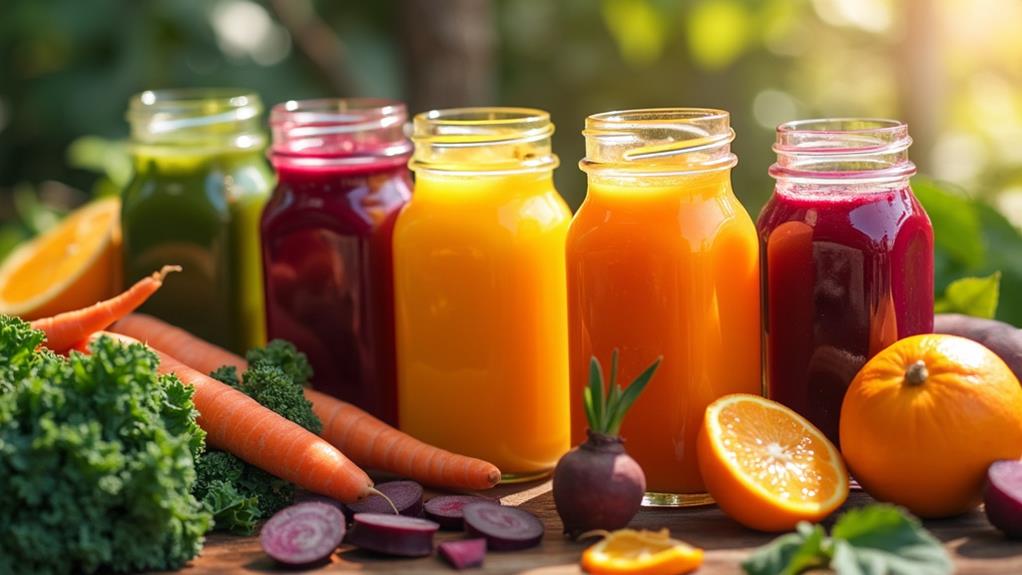Are Fruit Juices High in Sugar?
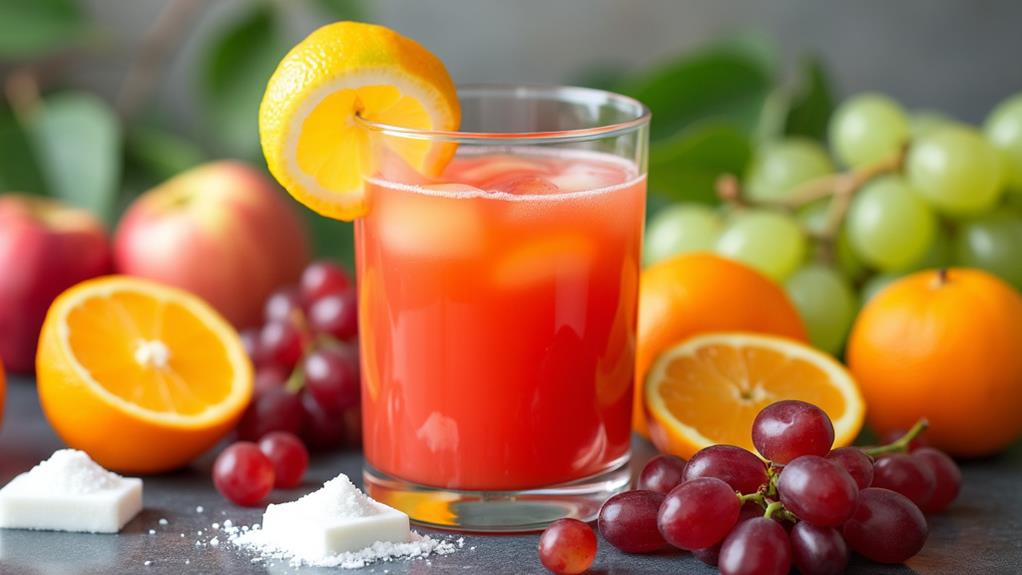
When you grab a glass of fruit juice, do you ever consider how much sugar you're consuming? Surprisingly, an 8-ounce serving can contain around 30 grams of sugar, comparable to many sugary sodas. This high sugar content is a concern for both adults and children, potentially leading to health issues such as obesity and diabetes. Unlike whole fruits, juices lack fiber and some vital nutrients, making them less beneficial. So, how can you enjoy fruit juices without compromising your health? Let's explore the balance between taste and nutrition.
Health Risks of Juice Consumption
It is crucial to understand the health risks associated with fruit juice consumption. An eight-ounce serving of fruit juice can contain around 30 grams (nearly 8 teaspoons) of sugar, comparable to sugary sodas. The World Health Organization classifies these sugars as free sugars, which are linked to serious health risks such as heart disease, stroke, and type 2 diabetes.
Choosing juice over whole fruits means missing out on essential fiber and nutrients, leading to higher sugar intake and potential nutritional imbalances. Whole fruits provide fiber that helps regulate sugar absorption, whereas juice lacks this critical component. The American Heart Association recommends a daily sugar limit of 36 grams for men and 25 grams for women, and just one serving of fruit juice can bring you close to or exceed these limits.
High juice consumption is especially concerning in children, as it can displace other nutritious foods in their diets, leading to nutritional deficiencies. This displacement can deprive them of essential nutrients needed for growth and development. Therefore, it is important to consider the health risks before opting for a glass of fruit juice.
Recommended Sugar Intake
To maintain optimal health, your daily sugar intake should be less than 10% of your total calories, with an ideal target of under 5%. For adults following a standard 2,000-calorie diet, this translates to no more than 50 grams, or approximately 12 teaspoons, of free sugars per day. Children should consume even less, ideally around 8-9 teaspoons, to ensure they receive adequate nutrition from other food sources.
Daily Sugar Limits
Understanding daily sugar limits is crucial for maintaining a healthy diet. The World Health Organization recommends keeping free sugars, including those in juice, below 10% of your total daily calories, ideally under 5% for optimal health. For a standard 2,000-calorie diet, that's a maximum of 50 grams (12 teaspoons) of free sugars, with 25 grams (6 teaspoons) being the ideal limit.
Consider this: an eight-ounce serving of juice contains about 30 grams of sugar, roughly 8 teaspoons. That's a significant portion of your daily limit in just one glass!
| Category | Sugar Content |
|---|---|
| Daily Limit | 50 grams (12 tsp) |
| Ideal Limit | 25 grams (6 tsp) |
| 8 oz. Juice | 30 grams (8 tsp) |
Regular juice consumption can quickly push you past these recommended limits. High juice intake doesn't just add free sugars to your diet; it can also displace more nutritious foods, making it harder to meet your health goals. By being mindful of juice and other high-sugar foods, you can better manage your overall sugar consumption and promote better health.
Children's Sugar Consumption
Recognizing the importance of managing your child's sugar intake can greatly impact their long-term health. Children's sugar consumption should be carefully monitored, especially in regard to fruit juices. The World Health Organization categorizes juice sugars as free sugars, similar to those found in soda. This classification means that fruit juices can contribute to excessive intake of sugars, potentially leading to various health issues.
Children should limit their free sugar intake to about 8-9 teaspoons daily to avoid chronic diseases. Excessive fruit juice consumption can displace more nutritious foods, potentially causing nutrient deficiencies that could harm overall development and health.
High intake of sugary beverages, including fruit juices, is linked to an increased risk of obesity and other related health issues. The American Heart Association recommends a maximum of 36 grams (9 teaspoons) of added sugar per day for men and 25 grams (6 teaspoons) for women. Monitoring fruit juice consumption can help your child maintain a balanced diet and prevent potential health problems in the future.
Nutritional Aspects of Juice
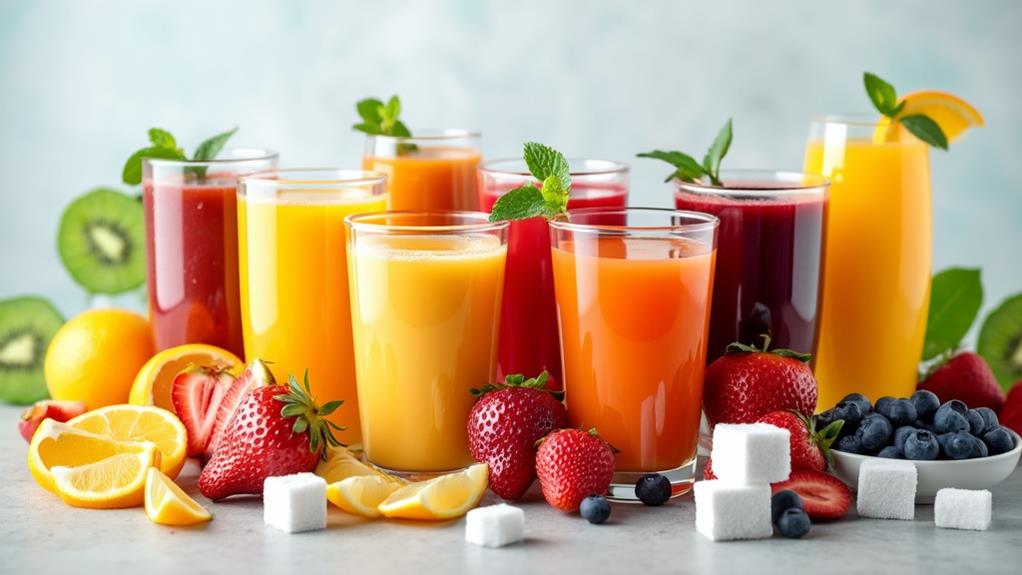
When you drink fruit juice, you're often consuming high levels of natural sugars—about 30 grams per eight-ounce serving, which is nearly 8 teaspoons. Unlike whole fruits, juices usually lack fiber and other crucial nutrients because the skin and pulp are removed. This leads to increased sugar intake without the accompanying health benefits. It's important to balance juice consumption with an awareness of its nutritional value and potential health impacts.
Sugar Content Analysis
An 8-ounce serving of fruit juice typically contains around 30 grams of sugar, equivalent to nearly 8 teaspoons. This sugar content is comparable to that of soda. Although the sugars in fruit juice are naturally derived from fruit, the concentration of multiple pieces of fruit into one serving significantly increases the sugar content.
The World Health Organization classifies the sugars in fruit juice as free sugars, which pose similar health risks to added sugars found in other sugary beverages. Unlike whole fruit, fruit juice is often low in fiber, meaning it doesn't provide the same feeling of fullness and can lead to higher calorie consumption.
Key points to consider:
- A glass of orange juice can contain approximately 23 grams of sugar.
- Free sugars in fruit juice can contribute to health issues.
- Whole fruit provides more fiber and satiety compared to juice.
- Moderate consumption (up to 5 ounces daily) may offer health benefits.
- Excessive intake can significantly increase total sugar consumption.
Understanding these aspects can help you make more informed choices about fruit juice consumption.
Nutritional Value Breakdown
The nutritional value of fruit juice includes both benefits and drawbacks. While 100% fruit juices are rich in natural sugars—an 8-ounce serving typically contains around 23 grams, similar to a sugary soda—this high sugar content can impact daily energy needs without the satiety benefits of fiber, often removed during juicing.
Despite the sugars, fruit juices provide essential vitamins and nutrients that support general health. However, the lack of fiber may lead to increased calorie consumption since you might not feel as full. Moderate consumption, up to 5 ounces daily, can offer health benefits, such as improved heart health. Conversely, excessive intake is associated with obesity and type 2 diabetes, affecting metabolic health.
Cold-pressed vegetable juices generally retain more vitamins and minerals than traditional fruit juices. For children, excessive fruit juice can replace other nutritious foods, leading to inadequate nutrient intake. Balancing juice consumption with whole fruits helps maintain a healthier diet.
Juice Vs. Whole Foods
Ever wondered why whole fruits are superior to fruit juices? When comparing juice to whole fruits, whole fruits clearly come out on top. Let's explore why.
First, the sugar in juice can be a real issue. An eight-ounce serving might pack the same sugar as two to four whole fruits. This high concentration of free sugars can lead to weight gain and lacks the fiber that whole fruits offer. Fiber aids digestion and keeps you feeling full longer, an essential component of a healthy diet.
Here's why whole fruits should be your go-to:
- Fiber Content: Whole fruits are rich in fiber, which aids digestion and increases satiety.
- Nutrient Density: The skin and pulp of fruits, often discarded during juicing, are packed with beneficial vitamins and minerals.
- Lower Sugar Intake: Eating whole fruits reduces the likelihood of overconsuming sugar.
- Hunger Management: Whole fruits are more filling than juices, helping prevent overeating.
- Dietary Guidelines: Experts recommend whole fruits for better health outcomes.
Special Considerations
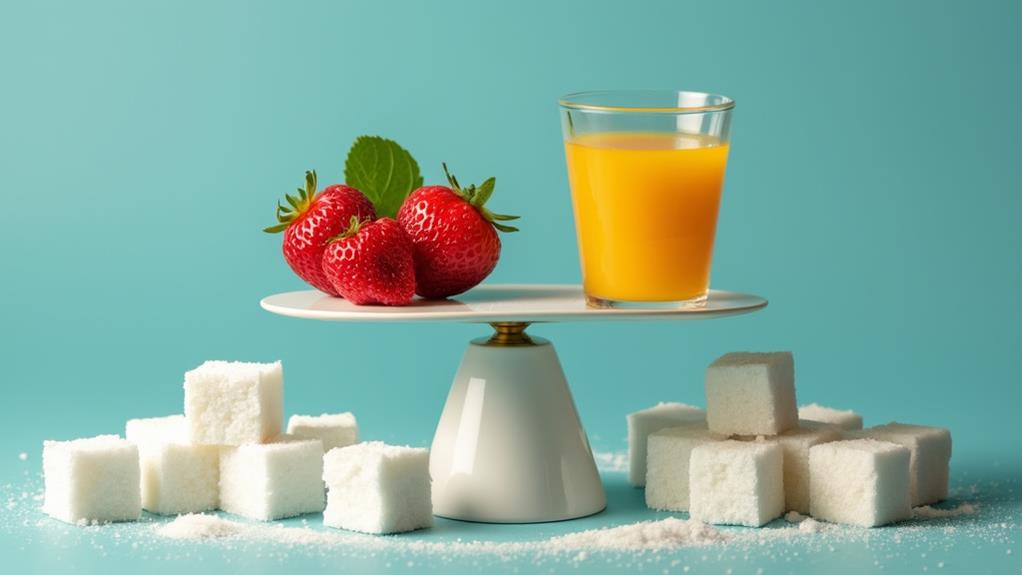
While whole fruits are generally the better choice, certain circumstances may necessitate special attention to fruit juice consumption. If you are on blood thinners, consult your healthcare provider before consuming fruit juices, as some can affect blood clotting and pose serious risks. For individuals with kidney disease, the high potassium levels in certain fruit juices can lead to complications, so monitoring your juice intake is essential.
Juice consumption can also lead to increased sugar intake, which is particularly concerning for those managing diabetes or metabolic disorders. Excessive sugar can spike blood glucose levels, complicating condition management. For children, too much juice can displace other nutritious foods, potentially leading to nutrient deficiencies and missing out on critical nutrients that whole foods provide.
Be cautious of marketing claims about the health benefits of fruit juices, as these often lack robust scientific backing. Always consider your specific health needs and consult your healthcare provider to ensure that your juice consumption aligns with your overall wellness goals.
Sugar Content Comparison
Comparing the sugar content in fruit juice to other sweetened beverages can be quite revealing. Both fruit juice and soda contain approximately 110 calories and 20-26 grams of sugar per 240 ml serving, underscoring their similar sugar levels. Health organizations classify the sugars in fruit juice as free sugars, similar to those found in sugar-sweetened drinks. Therefore, it's crucial to consume fruit juice in moderation, despite its perceived health benefits.
Consuming sugary drinks, including fruit juice, is associated with an increased risk of type 2 diabetes, metabolic syndrome, and heart disease. For instance, a typical glass of orange juice can contain around 23 grams of sugar, which is a substantial portion of the recommended daily sugar limit. Here's a quick comparison for reference:
- 240 ml soda: ~110 calories, 20-26 grams of sugar
- 240 ml fruit juice: ~110 calories, 20-26 grams of sugar
- 150 ml 100% fruit juice: Contains free sugars but also potential health benefits
- Larger servings of fruit juice: Can significantly contribute to daily sugar intake
- Moderation: Essential in balancing the benefits and risks
Impact on Weight Gain
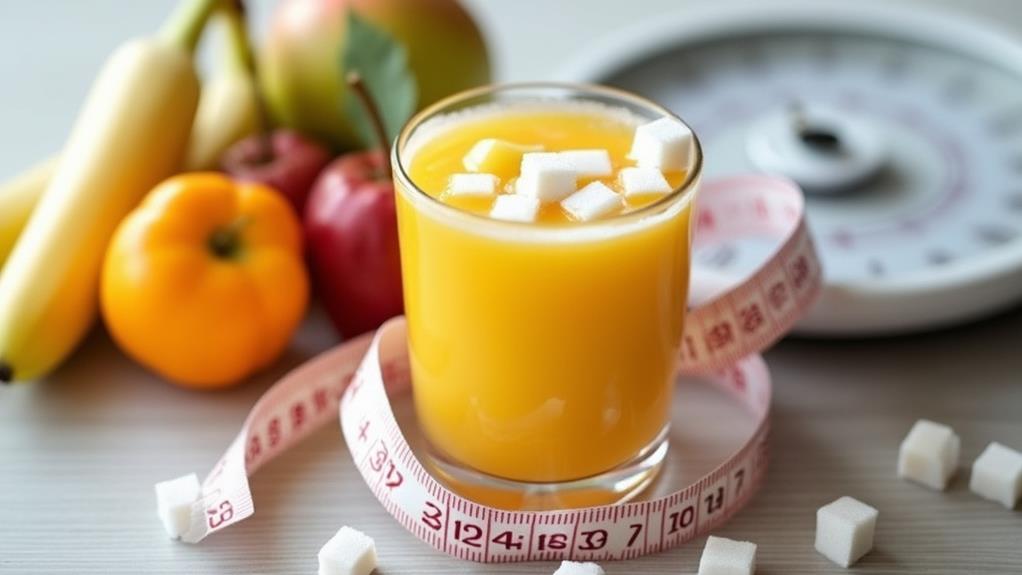
Consuming fruit juices, similar to other sugary beverages, can significantly impact weight gain due to their high calorie content and low fiber. When you drink fruit juice, you add calories to your daily intake without the satiety that whole fruits provide. This is because juices lack the fiber that promotes fullness, making it easier to overconsume calories.
The free sugars in fruit juice increase your caloric intake without substantially reducing your overall food consumption. This can complicate weight management, as liquid calories do not trigger the same fullness signals as solid foods. Consequently, you might consume the same amount of food as usual, plus the additional calories from the juice.
While moderate fruit juice intake—up to 150 ml—generally doesn't pose a risk for weight gain, excessive consumption can increase the risk of obesity. It's crucial to be aware of the sugar content, as a single cup of juice can contain the equivalent natural sugars of several fruits, quickly adding up in calories. To maintain a healthy weight, monitoring your fruit juice consumption is important.
Nutritional Benefits
In addition to being delicious, fruit juices offer significant nutritional benefits by providing essential vitamins and minerals that can enhance your overall diet. They are particularly rich in vitamin C and potassium, which are vital for general health. Consuming 100% fruit juice in moderation can yield several health benefits, such as improved immunity and lower cholesterol levels.
An 8-ounce cup of fruit juice can deliver nutrient levels comparable to those found in an equivalent amount of whole fruit, making it a convenient option for increasing fruit intake—especially useful for those who find it challenging to consume enough whole fruits daily.
Key nutritional benefits of fruit juices include:
- Vitamin C: Boosts immune function and supports skin health.
- Potassium: Aids in regulating blood pressure.
- Plant Compounds: Such as carotenoids and flavonoids, which may lower the risk of chronic diseases.
- Improved Cholesterol Levels: Linked to moderate fruit juice consumption.
- Reduced Blood Pressure and Stroke Risk: Associated with moderate intake (up to 500 mL/day).
Overall Health Effects
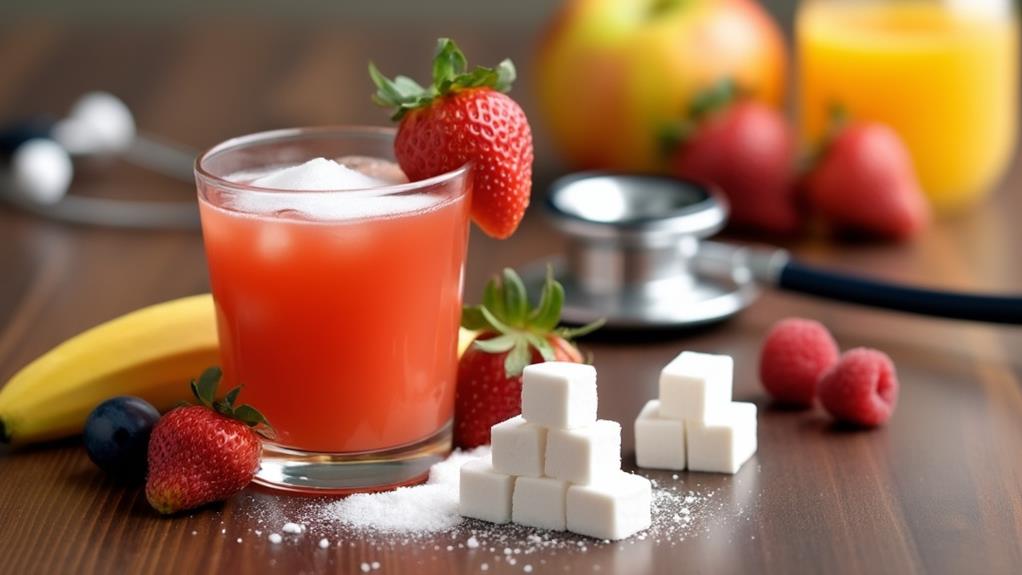
While fruit juices offer notable nutritional benefits, it's vital to evaluate their overall health effects. Both fruit juice and sugary sodas are high in free sugars and low in fiber, which can contribute to obesity and related health issues like type 2 diabetes. Scientific evidence indicates that excessive consumption of fruit juice can lead to high calorie intake without the satiating effects of whole fruits, making it important to monitor portion sizes.
However, moderate consumption of 100% fruit juice, up to 150 ml per day, can provide health benefits such as improved immunity, lower cholesterol levels, reduced blood pressure, and a lower risk of stroke. This differentiates fruit juice from sugary sodas, which lack such benefits. It is important to incorporate fruit juice as part of a balanced diet rich in diverse fruits and vegetables to enhance its positive impacts.
Ultimately, the key to reaping the health benefits of fruit juice while minimizing risks is moderation. By sticking to recommended portion sizes and not overindulging, you can enjoy the essential vitamins and nutrients fruit juice offers without compromising your health. Always remember, balance is fundamental to maintaining general well-being.

